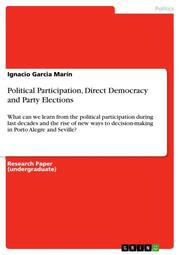-
Zusatztext
-
Research Paper (undergraduate) from the year 2011 in the subject Politics - Region: Middle and South America, grade: 1,7, Humboldt-University of Berlin, course: 2010-2011, language: English, abstract: In this paper I am going to describe the fall of conventional political participation within western European countries. Later on I am going to defend some possible ways to fix it and finally, I will expose my proposal: promotion of direct democracy through the Participatory Budgeting. With the cases of Porto Alegre and Seville, -with different situations and challenges the values of transparency, participation, deliberation and responsiveness become especially protagonist. Politicians often think that people do not have any interest for the political arena. In fact, rarely they make decisions to try to attract citizens to institutions. Like the current Prime Minister of the United Kingdom, David Cameron, they blame external factors to explain why citizenship refuses in part their representatives 1. The separation between citizen's demands and politician's rules could be a possible answer to the tragic riots during last weeks in England. Similarly, the reason for the Spanish Revolution that pushed during May and June millions of citizens of varied social groups into the streets is not only the tremendous unemployment rate. We cannot understand any social behavior if we exclude the political variable. Both David Cameron as Zapatero have decided strong economic cuts - hard to understand for citizens - while the voice of millions of Europeans against these decisions were expressed roundly. The sensation of politicians deaf respect citizens and the increasing idea that they do not solve anything is frequent. At the same time, social movements, demonstrations and claims thrive, creating a democracy with varied and multiple channels where ideas are expressed. Citizens are interested in politics, but the current representative system is marked by slowness and rigidity of the new times. Literature shows us how voter turnout and affiliations to political parties drop dramatically until today, with alarming rates of disaffection, skepticism and distrust to political institutions. People do not find solutions and support from parties, and the divorce is a fact. However, our societies are mature and prepared for more protagonism in decision-making. We should decide more times than once every four years. We want and we need. We have to walk to a new model of democracy. Then, how are the principal Participatory Budgeting's experiences? What can we learn from them?
-
Detailansicht
Political Participation, Direct Democracy and Party Elections
What can we learn from the political participation during last decades and the rise of new ways to decision-making in Porto Alegre and Seville?
ISBN/EAN: 9783656040668
Umbreit-Nr.: 1358443
Sprache:
Englisch
Umfang: 20 S.
Format in cm: 0.2 x 21 x 14.8
Einband:
kartoniertes Buch
Erschienen am 04.11.2011
Auflage: 3/2011


